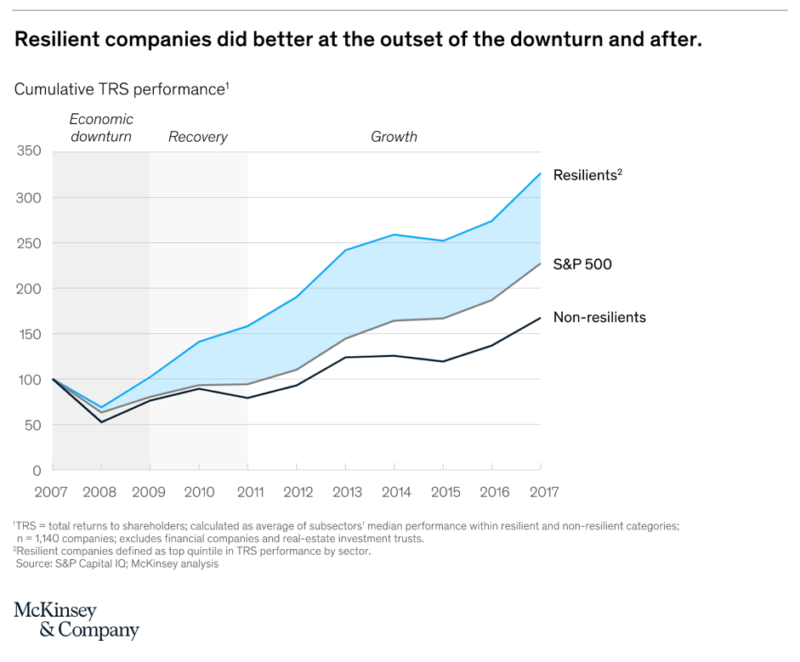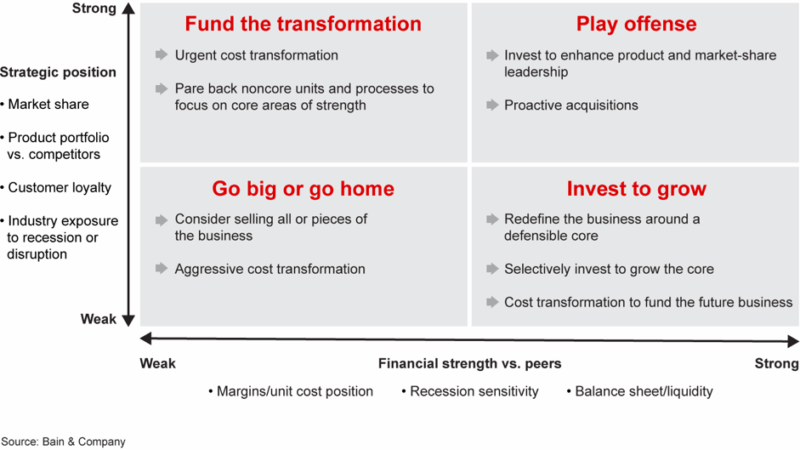Stay Calm, Balanced, & Future-focused
One needn’t forget that the actions taken towards the future during a recession are just as necessary as the steps taken to respond to unique events like COVID-19. We present these two questions to you:
What do you want your company to look like at the end of the recession? How about three years after that?
According to Bain & Company, the answer to these questions should structure your resilience strategy and facilitate all decision-making heading into the economic downturn. Starting with the end in mind gives you a clearer view of your goals and an optimistic sense of purpose. It helps you to define what areas of your business to focus on and invest in to achieve the desired end state – i.e. customer segments to target, value proposition to hone in on, and areas to digitise. Most importantly, a ‘future-back’ approach allows you to map out a plan of how you will outperform your competitors throughout and after the downturn. To keep your management team calibrated throughout a period of uncertainty, McKinsey senior partner Sven Smit recommends reminding everyone (and yourself) that you are dealing with an event – and maintaining a forward-thinking mindset is crucial.

Figure 1. The tangible results of building resilience into your business strategy.
Assess Your Current Position
When it comes to developing a recession strategy, no two companies are alike. In order to capitalise on an economic downturn, you must first conduct a realistic assessment of your company’s financial and strategic position.
Each business will have a different starting point that should inform the path they take. For example, if your business is in a strong financial position, but relatively weak market position, this presents an opportunity to focus the business around a defensible core offering, invest to grow this space, and transform costs to fund this future business direction. Conversely, if you find yourself in a weak financial position yet strong strategic position, then you should urgently focus on cost transformation while simultaneously paring back non-core areas of the business to focus on your key areas of strength. Companies in a strong financial and market position would be well-advised to invest in product and market share leadership. Of course, successfully achieving these objectives requires a realistic and considered plan. Management teams should analyse their current position, and map out an offensive strategy aimed at building a stronger business throughout and beyond the recession.

Figure 2. Mapping out your recession plan first requires an assessment of your company’s strategic and financial position.
As cleverly said by John F. Kennedy, the word ‘crisis’ can be synonymous with ‘danger’ but it can also stand for ‘opportunity’. Drawing from a collection of case studies, research papers and insights from experts like Harvard, Bain & Company, Deloitte, and McKinsey – we have compiled a report containing 12 proven resilience strategies which will help you gain a competitive advantage and thrive through a recession.
We would love to help you weather the storm by offering a complimentary strategy call with our Strategy Director, Grant Davidson. Grant has led our company and many others through three prior recessions over nearly three decades, thus has the experience and knowledge needed to help you assess the current standing of your business and identify growth opportunities.





